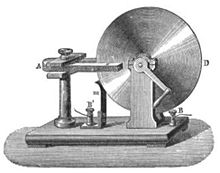Oh sure: http://www.sixmoons.com/audioreviews/furutech5/demag.html
"Working with the DeMag revealed something else that is quite a concern. Demagnetizing a CD or DVD improves the sound, period. The point being, you better repeat the treatment every time you spin a disc. As stated earlier, the rotation of the disc in a player causes the disc to get magnetized. At the time we tested the Furutech, we also had the opportunity to compare two other "magic" disc enhancers, the Nespa #1 and Nespa Pro by Nanotech. Both treat a CD or DVD permanently and with great results, by applying strong flashes of light as you can read in earlier reviews and in an upcoming coproduction with Srajan. Besides a difference in light power between the #1 and Pro, there is a difference in how the two Nespas hold the disc. The Pro uses a push'n'click release where the #1 uses a magnetic puck. Yes, a magnet holds the CD/DVD down while it is being treated. This method is also used by nearly every manufacturer of top-loading transports.
So here's the $64,000 question. Is it a good thing to use a magnet for holding discs down since we have seen that demagnetizing that same disc improves its sound qualities? Once again, the answer was in the listening. A pair of identical CDs were treated with both Nespas at comparable settings and played. The difference was very clear. The Pro treatment sounded better. Now we DeMag'd the Nespa #1 CD and compared it to the untreated Pro version. You guessed right, the #1 treated and degaussed CD bettered the Nespa Pro-only disc. This non-scientific experiment is good enough for our conscience to henceforth be very careful with letting anything magnetic into the vicinity of a CD/DVD.
Does from this follow that owners of CDPs with magnetic pucks won't benefit from degaussing? We don't know for sure yet but we fear that this might be true."
"Working with the DeMag revealed something else that is quite a concern. Demagnetizing a CD or DVD improves the sound, period. The point being, you better repeat the treatment every time you spin a disc. As stated earlier, the rotation of the disc in a player causes the disc to get magnetized. At the time we tested the Furutech, we also had the opportunity to compare two other "magic" disc enhancers, the Nespa #1 and Nespa Pro by Nanotech. Both treat a CD or DVD permanently and with great results, by applying strong flashes of light as you can read in earlier reviews and in an upcoming coproduction with Srajan. Besides a difference in light power between the #1 and Pro, there is a difference in how the two Nespas hold the disc. The Pro uses a push'n'click release where the #1 uses a magnetic puck. Yes, a magnet holds the CD/DVD down while it is being treated. This method is also used by nearly every manufacturer of top-loading transports.
So here's the $64,000 question. Is it a good thing to use a magnet for holding discs down since we have seen that demagnetizing that same disc improves its sound qualities? Once again, the answer was in the listening. A pair of identical CDs were treated with both Nespas at comparable settings and played. The difference was very clear. The Pro treatment sounded better. Now we DeMag'd the Nespa #1 CD and compared it to the untreated Pro version. You guessed right, the #1 treated and degaussed CD bettered the Nespa Pro-only disc. This non-scientific experiment is good enough for our conscience to henceforth be very careful with letting anything magnetic into the vicinity of a CD/DVD.
Does from this follow that owners of CDPs with magnetic pucks won't benefit from degaussing? We don't know for sure yet but we fear that this might be true."







